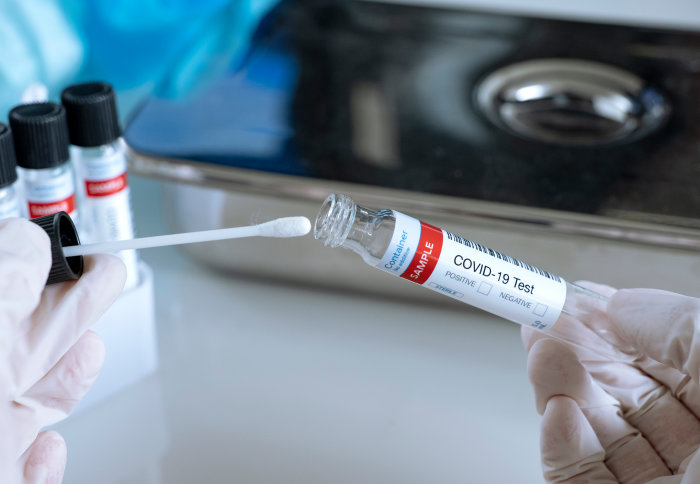Lab-free COVID-19 test trialled in London hospitals

Representation of a swab for COVID-19
DnaNudge’s MHRA-approved rapid COVID-19 test is now rolling out in urgent patient care settings across London hospitals.
DnaNudge’s rapid, lab-free COVID-19 test, developed by Imperial College London’s Regius Professor of Engineering Chris Toumazou, offers gold-standard accuracy and sample-to-result in around an hour. The test is now being rolled out in urgent patient care settings following approval for clinical use by the Medicines and Healthcare Products Regulatory Agency (MHRA), granted at the end of April after successful patient trials. The DnaNudge test achieves sensitivity of 98% and specificity of 100%.

Roll-out in urgent care settings
The Lab-in-Cartridge PCR test has been developed by Professor Toumazou and his team and reduces the current 1-2 day wait for results.
Following an initial Department of Health and Social Care order of 10,000 cartridges in March, the UK government has procured a further 70,000 cartridges. The DnaNudge test is now being rolled out in urgent care settings – including cancer wards, A&E and maternity departments – at Chelsea and Westminster Hospital, West Middlesex University Hospital, St. Mary’s Hospital and Queen Charlotte’s and Chelsea Hospital.
The DnaNudge test does not need a laboratory, delivers gold-standard accuracy, and requires no pre-processing or manual steps (the sample is inserted directly into the cartridge). Crucially, it also includes a unique control feature that indicates swab efficacy, and whether a re-test is required.
Fast, reliable results
The truly ground-breaking innovations in this DnaNudge test are its high level of accuracy and its throughput of around an hour Chris Toumazou Regius Professor of Engineering at Imperial College London and CEO and co-founder of DnaNudge
Professor Chris Toumazou FRS, CEO and co-founder of DnaNudge and founder of the College’s Institute of Biomedical Engineering commented: “The truly ground-breaking innovations in this DnaNudge test are its high level of accuracy and its throughput of around an hour – direct from sample to result, with no manual steps required. This makes it the only non-lab, non-human interaction Point-of-Care solution available, and this is why it is being rapidly adopted by senior clinicians to deliver fast, reliable results that make a huge difference to the care and safety of both patients and staff.”
Professor Graham Cooke, NIHR Research Professor of Infectious Diseases at Imperial who is leading the clinical development said: “This is one of the most exciting technologies I’ve seen in this area, particularly because it avoids the need for any sample handling. Our early results are very encouraging and now we need to see how the test performs in different clinical settings and understand where it might have the biggest impact on care at this critical time.”

Nutritional analysis
The DnaNudge COVID-19 test has been adapted from the DnaNudge in-store DNA testing service, which was launched to consumers last year. The service focuses on nutrition, analysing and mapping users’ genetic profile to key nutrition-related health traits.

With the results of a quick, one-time test, customers can use a DnaNudge smartphone App or wrist-worn DnaBand to scan product barcodes in the majority of major UK supermarkets, and discover whether a food product is ‘red’ or ‘green’ for their unique genetic make-up. The test has been converted to detect the RNA of COVID-19.
DnaNudge is an Imperial spinout with labs at the College’s White City Campus.
Article text (excluding photos or graphics) © Imperial College London.
Photos and graphics subject to third party copyright used with permission or © Imperial College London.
Reporter
Joanna Wilson
Communications Division